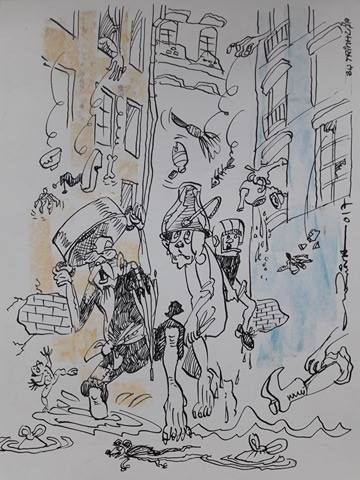 Talk Around Town
Talk Around Town

The news that HCM City intends to build housing estates for low-income workers means my commute to office is set to get longer and more difficult.
 |
By Thu Ngân
The news that HCM City intends to build housing estates for low-income workers means my commute to office is set to get longer and more difficult.
I live in District 7 adjacent to Nhà Bè District, which is the front runner for being chosen as the venue for the workers’ housing.
To reach downtown for work from here involves crossing canals or rivers at all district borders – as is the norm in HCM City -- and there are bridges only at a few places like Kênh Tẻ, Tân Thuận and Nguyễn Văn Cừ.
In recent years due to the mushrooming of housing projects, these bridges have, without exception, become bottlenecks.
Crossing them is a nightmare for me every morning and it takes at least 10-15 minutes to inch through the roads leading to the bridges.
Cars line up on three or four lanes and bikes are everywhere like a disturbed line of ants.
Just as I am getting used to biting the bullet comes the news which is sure to make the bullet into a cannon ball.
Social houses built means more people will live in the area, put a stronger impact on local infrastructure.
HCM City Party Secretary Đinh La Thăng visited Bình Dương Province earlier this month and was deeply impressed by the social housing model there, and urged city authorities to consider a similar policy.
He pointed to the huge housing demand among low-income workers, and said apartments of 25-35sq.m like in the neighbouring province should be built.
Thăng’s suggestion has sparked animated discussions among the populace and, especially, in the housing market.
They centre mostly on the price, which Thăng said must be similar to Bình Dương’s VNĐ100 million (US$4,800).
An executive from a property company, who asked for anonymity, told Việt Nam News that while the idea is good it may not be feasible to emulate Bình Dương.
For VNĐ100 million you can only build a kitchen in HCM City, she joked, pointing out that the price of a flat is decided by land prices, which are very high in HCM City.
Nguyễn Văn Đực, deputy director of Đất Lành Real Estate Company, also hailed the idea but said the houses were sold at VNĐ100 million in Bình Dương five years ago.
Besides, if it cost VNĐ100-200 million in Bình Dương, it would cost VNĐ200-300 million in HCM City, he said.
Economist Đinh Thế Hiển said the problem was not with the price but with the very idea.
He said for one thing the city should not develop industrial zones but should focus on the services, technology and financial sectors.
He wanted existing industrial zones to be moved to neighbouring provinces.
The other big problem he foresaw with low-priced social housing was that it would attract more immigrants to HCM City, whose infrastructure is already creaking under the weight of the demands placed on it.
He has a point since Việt Nam’s urban migration rate is very high.
A big city that not only offers jobs with better incomes but also good accommodation is a magnet to the rural poor.
HCM City has a population of 13 million, and its infrastructure is failing to keep pace with the rapid growth in the housing market.
This is why I feared for my daily commute in the beginning.
Furthermore, at such low prices, what kind of quality can we expect the workers’ houses to have? Their occupants might be lucky if the worst things that happen are water seepage and peeling plaster.
You only need to look at some of the year-old apartment buildings in Linh Đàm urban area in Hà Nội or Nhà Bè District in HCM City.
Even if by a miracle the government manages to build good quality housing at these prices, it will have a big headache on its hands managing them. How will it be able to identify low-income workers and prevent speculation as the vultures move in?
It won’t look very clever, will it, if some people pocket the money while workers still do not have houses?
Finally, there is a real threat that putting many low-income people in one place could give rise to a new slum even as the city is dismantling existing ones and relocating their residents.
For a long time I have wondered but been unable to get a reasonable answer: Why do Vietnamese have a predilection for owning a house? Many work hard lifelong with the sole aim of buying a house, especially in big cities.
Instead of spending all their money and more on buying a house, why don’t they spend it on travel and other things to improve the quality of their life?
People in other countries seem to be doing alright despite leasing houses their whole life. Why not Vietnamese? -- VNS